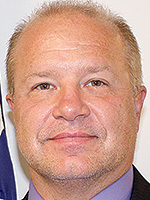Senior Reporter
No Final Hair Testing Rule Yet, but HHS Plans to Add More Drugs to Tests

[Stay on top of transportation news: Get TTNews in your inbox.]
The Department of Health and Human Services could by early next year add fentanyl and methadone to its list of drugs that federal and safety-sensitive workers must be tested for, a top drug official said. However, Ron Flegel, chairman of the federal Drug Testing Advisory Board that developed the controversial proposed mandatory guidelines for federal drug testing using hair samples, was mum at a March 2 meeting on when HHS plans to issue a final hair testing rule.
“The Substance Abuse and Mental Health Services Administration is currently engaged in reviewing the comments that were received during the public comment period which closed on Nov. 9,” Flegel said. “I believe there were over 700 individual public comments.”
The board is part of SAMHSA, which is a subagency of HHS.

Flegel
The rule has reached step 12 of 17 in the exhaustive process it must travel through before publication in the Federal Register as a final rule.
The proposed guidelines, first detailed in a Sept. 10 Federal Register announcement, drew immediate opposition from some trucking trade groups due to a provision that requires employers to also perform a urine or oral swab drug test when a prospective employee tests positive for drug use in a hair sample test.
Although new final mandatory guidelines for drug testing using oral fluids went into effect on Jan. 1, Bohdan Baczara of the Department of Transportation’s Office of Drug and Alcohol Policy Compliance, told the DTAB that DOT has yet to authorize the test for security-sensitive federal workers, including truck drivers.
Criticism of the proposed rule has not been limited to the trucking industry, where hair testing has for years been successfully used by some motor carriers to weed out drug users applying to work as drivers — even those who have passed a federally sanctioned urinalysis drug test.
“We disagree with the department’s proposal to collect an alternate authorized drug testing specimen to be used when there is a confirmed positive hair drug test,” Quest Diagnostics, one of the nation’s largest drug testers, said in written comments. “Hair testing has long been used to assess whether an individual has a pattern of regular drug use that may not be detected by an oral fluid or urine test, which both detect recent use.
“The collection of an alternative specimen creates additional burden and costs for employers, collection sites and laboratories. This is especially true if the employer’s protocol is to always collect an alternative specimen which would only be needed 4-10% of the time.”
Quest published data as far back as 2009 comparing the results of more than 193,000 simultaneously collected urine and hair specimens. “These data demonstrate the power of a hair test in detecting drug use that may be missed by urine and, presumably, oral fluid testing that detect only recent use,” Quest wrote.
The Substance Abuse Program Administrators Association, a nonprofit trade association whose members include alcohol and drug testing service agents, medical review officers, HHS certified laboratories, manufacturers of testing devices and collection sites, also opposed the HHS proposal.

Fleets are investing in tech-based safety tools that inform and forewarn potential risk. But how do they condition and prepare drivers to respond to safety alerts? Find out as the RoadSigns Team speaks with Tom DiSalvi, VP of safety at Schneider National, and Charlie Mohn, director of product innovation at Drivewyze. Hear a snippet, above, and get the full program by going to RoadSigns.TTNews.com.
“The use of urine or oral fluid test results should not be used to challenge or dispute hair testing results and vice versa,” the group said. “If the science and processes do not support hair testing as an independent test, it should not be used in federal testing programs.”
In a public statement during the DTAB meeting, Abigail Potter, a drug policy expert for American Trucking Associations, was highly critical of the HHS proposed hair testing rule.
“ATA has identified several alarming implementation concerns with the proposal,” Potter told DTAB members. “If codified, it could have devastating effects on the current level of highway safety and could increase private‐sector employers’ employment and liability litigation risk.”
She added, “Specifically, the proposal’s requirement for additional evidence through the testing of an alternative specimen such as oral fluid or urine ostensibly to determine whether a positive hair result constituted a ‘false negative’ does not, in fact, accomplish that goal. The agency’s choice to impose the requirement is arbitrary and capricious.”
Want more news? Listen to today's daily briefing below or go here for more info:

